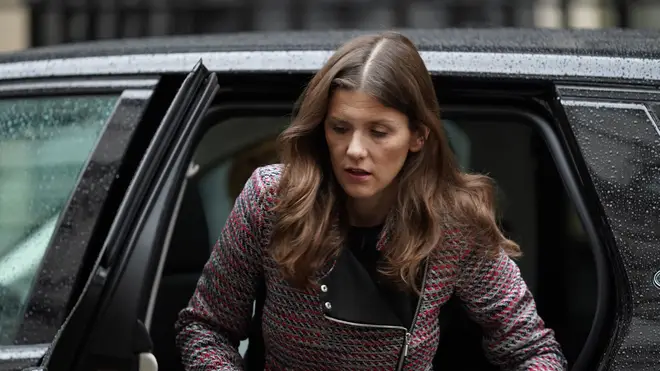
Nick Abbot 10pm - 1am
29 November 2022, 15:28

‘Legal but harmful’ duties are being dropped as the Culture Secretary said they would have ‘stifled’ free speech.
The Government has dropped measures to ban “legal but harmful” web content, in what campaigners called a “watering down” of the Online Safety Bill that is “very hard to understand”.
Removing the restrictions marks a more “common-sense” approach as they risked an “erosion of free speech”, the Culture Secretary said.
Michelle Donelan also argued the axed measures had been an “anchor” stalling the Bill, which has been subject to repeated delays.
The ditching of “legal but harmful” duties marks a win for free speech proponents including Trade Secretary Kemi Badenoch, who claimed they would “legislate for hurt feelings”, but the move faces criticism from other corners of the Tory party.
Ms Donelan’s predecessor Nadine Dorries warned that women would “kick off” about dropping the measures.
The former culture secretary, who championed the Bill in its previous form, cited the case of Molly Russell, 14, who killed herself after viewing self-harm content online.
Molly’s father Ian Russell said the changes to the Bill pointed to a “watering down” of the legislation, as young people who are “likely to find a way around” age verification checks may still be exposed to “legal but harmful” material.
“This is the type of content that sapped the life force out of Molly and that stopped her wanting to live any more,” he said.
Despite his concerns, he said what is “most important now is that the Bill continues to progress at pace so that it is passed into law next year”.
“This is vital as it could quite literally save lives,” he said.

Mr Russell earlier told BBC Radio 4’s Today programme the revisions to the legislation were “very hard to understand”.
Ms Donelan said the Government is “in essence” introducing “legal but harmful for children” through other provisions in the Bill.
She said protections for children have been strengthened and it would be a “gross misrepresentation” to argue otherwise.
“Nothing is getting watered down or taken out when it comes to children,” she told Today.
“The legal but harmful aspect was pertaining to adults. Content that is harmful or could hurt children that is not illegal, so is legal, will still be removed under this version of the Bill.
“So the content that Molly Russell saw will not be allowed as a result of this Bill.”
The legislation aims to tackle the “absurd situation” surrounding the enforcement of age limits, Ms Donelan said, with social media firms that fail to bar under-age children from their platforms facing massive fines.
The updates will require tech firms to show how they enforce their own age restrictions, to publish summaries of risk assessments on potential harm to children on their sites, and to declare details of enforcement action taken against them by Ofcom – the new regulator for the tech sector.
Ofcom can fine social media giants up to 10% of annual turnover if they fail to fulfil policies to tackle racist, homophobic or other content harmful to children.
Mr Russell said requiring tech firms to publish their risk assessments is a “good idea”, but warned it is “hard to trust them to be completely transparent about the dangers on their platforms”
“I fear this will be an exercise in marking their own homework,” he said.
For adults there will be a greater requirement for firms to provide tools to hide certain content they do not wish to see.
The amended Bill would require platforms to remove illegal content and take down any material that is in breach of its own terms of service.
The Government calls the approach a “triple shield” of online protection which also allows for freedom of speech.
It partly replaces the “legal but harmful” duties, which would have created a “quasi-legal category” and potentially “stifled” free speech, Ms Donelan said during a broadcast round on Monday morning.
She said the Bill, which has been “a long time coming”, would become law “during this parliamentary session” and would serve as a “blueprint” for boosting internet safety for countries around the world.
Downing Street on Tuesday said that the Bill strikes “the right balance” to protect free speech.
It declined to be drawn on a timeline for the progress of the legislation through Parliament, but said the Government wanted to have “the new regime operational as soon as possible after Royal Assent”.
1/2I have to correct these errors in @thetimes where @KemiBadenoch makes her bid to be the next PM.
The online safety bill puts in place greater protections for freedom of speech than we have right now. It makes what is illegal offline, illegal online. pic.twitter.com/EavghRnFnl
— Nadine Dorries (@NadineDorries) July 10, 2022
The changes set Ms Donelan on a collision course with Ms Dorries, who recently told the House magazine: “Michelle has been in the job five minutes and does not understand enough about it.”
Shadow culture secretary Lucy Powell said it was a “major weakening” of the legislation, adding: “Replacing the prevention of harm with an emphasis on free speech undermines the very purpose of this Bill, and will embolden abusers, Covid deniers, hoaxers, who will feel encouraged to thrive online.”
The latest changes follow other updates to the Bill, including criminalising the encouragement of self-harm, “downblousing” and the sharing of pornographic “deepfakes”.
The Government also confirmed further amendments will be tabled shortly aimed at boosting protections for women and girls online.
The Victim’s Commissioner, Domestic Abuse Commissioner and Children’s Commissioner will be added as statutory consultees to the Bill, meaning that Ofcom must consult them in drafting new codes of conduct tech firms must follow to comply with the legislation.
The Bill is due to return to Parliament next week after being repeatedly delayed.